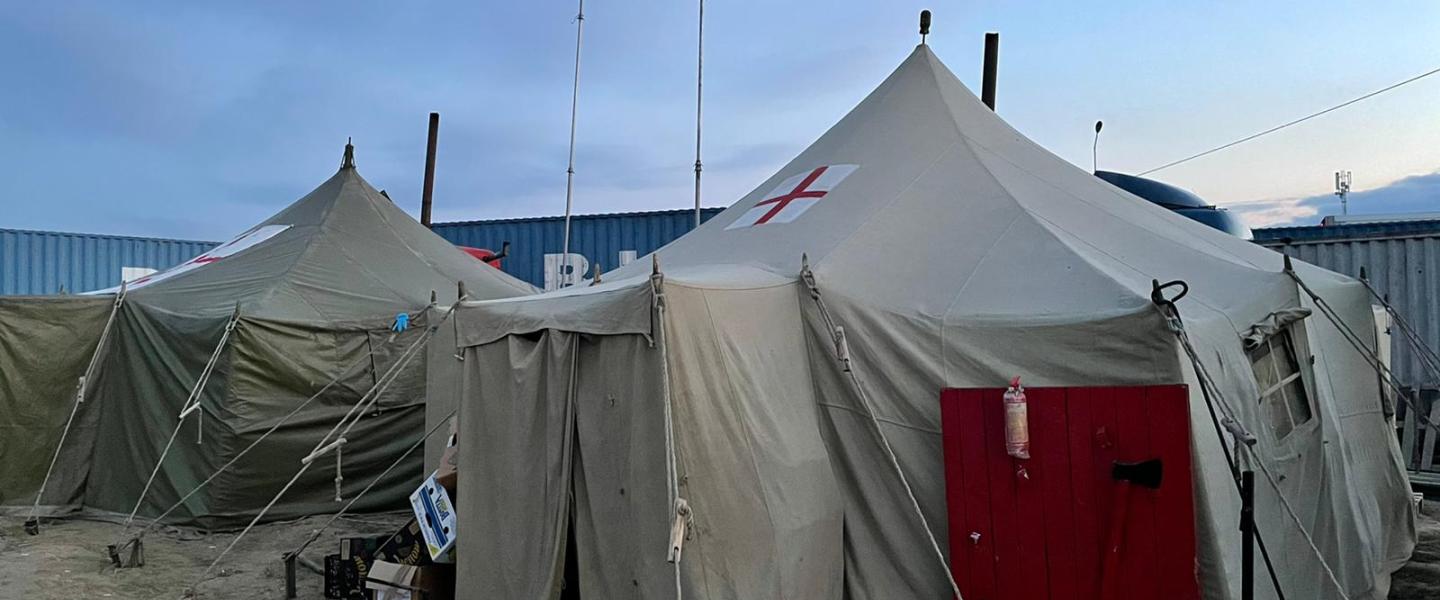“I wish you well and hope you come back alive” said the Romanian Border Police. So began the Human Rights at Sea journey into Ukraine.
The sub-zero temperatures of southern Ukraine this last week have meant that during the curfew hours, the Human Rights at Sea team had to remain at a secure location overnight in their vehicle before an onward move at 0600 along previously shelled coastal routes south of Odesa.
On hearing the mission to establish local connections and document human rights abuses and war crimes in the maritime sector with new colleagues from the Ukraine Bar Association, a friendly border guard with some good English pointed us to the humanitarian tents set up by local charities.
There, our team met a Ukrainian seafarer turned humanitarian rescuer.
Inside a drooping canvas faintly damp-smelling 1940’s era bell tent with a red cross on the front and on a floor of wooden pallets with two wrought-iron beds and a table with a hot water boiler were a collection of aid workers, civil society helpers and Yuriy, a former Ordinary Seaman and Motorman from a crew of a port tug previously based out of one of the southern Ukrainian ports.
A jovial and proud man, he shared the photos of his vessel on his phone and retold his seafaring moments, including his excitement for pending promotion curtailed by the war.
Along with his wife, now based in Odesa, four hours away and along with other dedicated staff, he was undertaking daily car runs south from the fortress city to border crossings with Romania, bringing out refugee families and reuniting them with relatives across the Danube River.
Yuriy had to leave the remainder of his family behind in a location currently under attack. He just shrugged when asked how they were.
He shook his head as we talked in broken English about the war and its ramifications on Ukrainian society before quickly switching to lighter-hearted discussions quizzing about the last Europa League game and the fortunes of West Ham football club. Then, it was onto the current woes for Chelsea.
Tomorrow, he repeats the run again to Odesa between the curfew times with the aim of bringing more people to safety. And just like his seafaring, he keeps an impressively level head.
Yuriy advises us how to negotiate the multitude of roadblocks so we can make our meetings and collect evidence around a locked-down commercial port and strategic objective that contains circa 100 vessels still manned by around an estimated 1500 seafarers, all of whom may be caught in crossfire, or could be directly targeted as the war approaches and the air attacks increase.
The deliberate targeting of non-combatants would breach the Geneva Conventions of 1949.
We agree that a ceasefire is required without delay before Yuriy lifts the lid from a battered aluminium milk churn next to the log-fed stove and offers up a large spoonful of Ukrainian honey and a cup of tea, which he insists on making.
ENDS.
